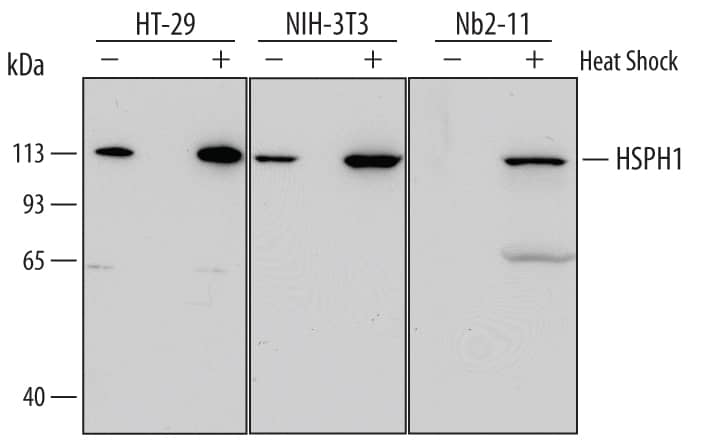HSPH1 Products
The heat shock proteins (HSPs) are a highly conserved family of stress response proteins. HSPs function primarily as molecular chaperones, facilitating the folding of other cellular proteins, preventing protein aggregation, or targeting improperly folded proteins to specific degradative pathways. Heat Shock Proteins are ubiquitously expressed in all organisms. They are induced in response to various types of environmental stresses like heat, cold, and oxygen deprivation.
Heat shock protein H1 (HSPH1), also known as HSP105 and HSP110, exists as two isoforms, alpha and beta. HSPH1 alpha consists of 858 amino acids whereas HSPH1 beta has 814 amino acids. Alpha and beta have calculated molecular weights of 96.4 kDa and 92 kDa, respectively, but an apparent molecular weight of 105 - 110 kDa in SDS-PAGE. HSPH1 acts as a chaperone to prevent thermal aggregation in mammalian cells. HSPH1 alpha and beta isoforms share 94% identity. Rat HSPH1 has 92% and 97% identity to human and mouse HSPH1, respectively.
131 results for "HSPH1" in Products
131 results for "HSPH1" in Products
HSPH1 Products
The heat shock proteins (HSPs) are a highly conserved family of stress response proteins. HSPs function primarily as molecular chaperones, facilitating the folding of other cellular proteins, preventing protein aggregation, or targeting improperly folded proteins to specific degradative pathways. Heat Shock Proteins are ubiquitously expressed in all organisms. They are induced in response to various types of environmental stresses like heat, cold, and oxygen deprivation.
Heat shock protein H1 (HSPH1), also known as HSP105 and HSP110, exists as two isoforms, alpha and beta. HSPH1 alpha consists of 858 amino acids whereas HSPH1 beta has 814 amino acids. Alpha and beta have calculated molecular weights of 96.4 kDa and 92 kDa, respectively, but an apparent molecular weight of 105 - 110 kDa in SDS-PAGE. HSPH1 acts as a chaperone to prevent thermal aggregation in mammalian cells. HSPH1 alpha and beta isoforms share 94% identity. Rat HSPH1 has 92% and 97% identity to human and mouse HSPH1, respectively.
| Reactivity: | Human, Mouse, Rat |
| Details: | Goat IgG Polyclonal |
| Applications: | WB, IHC |
| Reactivity: | Human, Mouse, Rat |
| Details: | Mouse IgG1 Monoclonal Clone #531104 |
| Applications: | WB |
| Reactivity: | Human, Mouse |
| Details: | Rabbit IgG Polyclonal |
| Applications: | IHC, WB, ICC/IF |
| Reactivity: | Human, Mouse, Rat |
| Details: | Goat IgG Polyclonal |
| Applications: | WB, IHC |
| Reactivity: | Human, Mouse, Rat |
| Details: | Goat IgG Polyclonal |
| Applications: | WB, IHC |
| Reactivity: | Human, Mouse, Rat |
| Details: | Goat IgG Polyclonal |
| Applications: | WB, IHC |
| Reactivity: | Human, Mouse, Rat |
| Details: | Goat IgG Polyclonal |
| Applications: | WB, IHC |
| Reactivity: | Human, Mouse, Rat |
| Details: | Goat IgG Polyclonal |
| Applications: | WB, IHC |
| Reactivity: | Human, Mouse, Rat |
| Details: | Goat IgG Polyclonal |
| Applications: | WB, IHC |
| Reactivity: | Human, Mouse, Rat |
| Details: | Goat IgG Polyclonal |
| Applications: | WB, IHC |
| Reactivity: | Human, Mouse, Rat |
| Details: | Goat IgG Polyclonal |
| Applications: | WB, IHC |
| Reactivity: | Human, Mouse, Rat |
| Details: | Mouse IgG1 Monoclonal Clone #531104 |
| Applications: | WB |
| Reactivity: | Human, Mouse, Rat |
| Details: | Mouse IgG1 Monoclonal Clone #531104 |
| Applications: | WB |
| Reactivity: | Human, Mouse, Rat |
| Details: | Mouse IgG1 Monoclonal Clone #531104 |
| Applications: | WB |
| Reactivity: | Human, Mouse, Rat |
| Details: | Mouse IgG1 Monoclonal Clone #531104 |
| Applications: | WB |
| Reactivity: | Human, Mouse, Rat |
| Details: | Mouse IgG1 Monoclonal Clone #531104 |
| Applications: | WB |
| Reactivity: | Human, Mouse, Rat |
| Details: | Mouse IgG1 Monoclonal Clone #531104 |
| Applications: | WB |
| Reactivity: | Human, Mouse, Rat |
| Details: | Mouse IgG1 Monoclonal Clone #531104 |
| Applications: | WB |
| Reactivity: | Human, Mouse, Rat |
| Details: | Mouse IgG1 Monoclonal Clone #531104 |
| Applications: | WB |
| Reactivity: | Human |
| Details: | Mouse IgG2b Kappa Monoclonal Clone #J1G12 |
| Applications: | WB, ELISA, ICC/IF, Flow |
| Reactivity: | Human |
| Details: | Rabbit IgG Polyclonal |
| Applications: | WB, ICC/IF |
| Reactivity: | Human |
| Details: | Rabbit IgG Polyclonal |
| Applications: | IHC |
Recombinant Monoclonal Antibody
| Reactivity: | Human, Mouse, Rat |
| Details: | Rabbit IgG Monoclonal Clone #9Y7M10 |
| Applications: | WB |
| Applications: | AC |
| Applications: | WB |




![Immunocytochemistry/ Immunofluorescence: HSPH1/HSP105 Antibody [NBP1-89662] Immunocytochemistry/ Immunofluorescence: HSPH1/HSP105 Antibody [NBP1-89662]](https://resources.bio-techne.com/images/products/HSPH1-HSP105-Antibody-Immunocytochemistry-Immunofluorescence-NBP1-89662-img0007.jpg)
![Western Blot: HSPH1/HSP105 Antibody (J1G12)BSA Free [NBP1-04304] Western Blot: HSPH1/HSP105 Antibody (J1G12)BSA Free [NBP1-04304]](https://resources.bio-techne.com/images/products/HSPH1-HSP105-Antibody-J1G12-Western-Blot-NBP1-04304-img0003.jpg)
![Western Blot: HSPH1/HSP105 Antibody [NBP2-55047] Western Blot: HSPH1/HSP105 Antibody [NBP2-55047]](https://resources.bio-techne.com/images/products/HSPH1-HSP105-Antibody-Western-Blot-NBP2-55047-img0004.jpg)
![Immunohistochemistry-Paraffin: HSPH1/HSP105 Antibody [NBP2-97291] Immunohistochemistry-Paraffin: HSPH1/HSP105 Antibody [NBP2-97291]](https://resources.bio-techne.com/images/products/HSPH1-HSP105-Antibody-Immunohistochemistry-Paraffin-NBP2-97291-img0001.jpg)
![Western Blot: HSPH1/HSP105 Antibody (9Y7M10) [NBP3-16463] Western Blot: HSPH1/HSP105 Antibody (9Y7M10) [NBP3-16463]](https://resources.bio-techne.com/images/products/HSPH1-HSP105-Antibody-9Y7M10-Western-Blot-NBP3-16463-img0001.jpg)
![Western Blot: HSPH1/HSP105 Overexpression Lysate [NBL1-11769] Western Blot: HSPH1/HSP105 Overexpression Lysate [NBL1-11769]](https://resources.bio-techne.com/images/products/Hsp105-Overexpression-Lysate-Adult-Normal-Western-Blot-NBL1-11769-img0002.jpg)